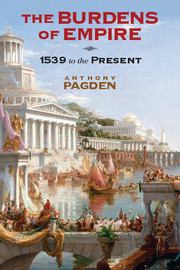Book contents
- Frontmatter
- Dedication
- Contents
- Preface
- Acknowledgements
- Introduction: Anatomy of Empire from Rome to Washington
- 1 Defending Empire: The School of Salamanca and the ‘Affair of the Indies’
- 2 ‘Making Barbarians into Gentle Peoples’: Alberico Gentili on the Legitimacy of Empire
- 3 The Peopling of the New World: Ethnos, Race, and Empire in the Early-Modern World
- 4 Conquest, Settlement, Purchase, and Concession: Justifying the English Occupation of the Americas
- 5 Occupying the Ocean: Hugo Grotius and Serafim de Freitas on the Rights of Discovery and Occupation
- 6 Cambiar su ser: Reform to Revolution in the Political Imaginary of the Ibero-American World
- 7 From the “Right of Nations” to the “Cosmopolitan Right”: Immanuel Kant's Law of Continuity and the Limits of Empire
- 8 “Savage Impulse-Civilized Calculation”: Conquest, Commerce, and the Enlightenment Critique of Empire
- 9 Human Rights, Natural Rights, and Europe's Imperial Legacy
- Bibliography
- Index
6 - Cambiar su ser: Reform to Revolution in the Political Imaginary of the Ibero-American World
Published online by Cambridge University Press: 05 March 2015
- Frontmatter
- Dedication
- Contents
- Preface
- Acknowledgements
- Introduction: Anatomy of Empire from Rome to Washington
- 1 Defending Empire: The School of Salamanca and the ‘Affair of the Indies’
- 2 ‘Making Barbarians into Gentle Peoples’: Alberico Gentili on the Legitimacy of Empire
- 3 The Peopling of the New World: Ethnos, Race, and Empire in the Early-Modern World
- 4 Conquest, Settlement, Purchase, and Concession: Justifying the English Occupation of the Americas
- 5 Occupying the Ocean: Hugo Grotius and Serafim de Freitas on the Rights of Discovery and Occupation
- 6 Cambiar su ser: Reform to Revolution in the Political Imaginary of the Ibero-American World
- 7 From the “Right of Nations” to the “Cosmopolitan Right”: Immanuel Kant's Law of Continuity and the Limits of Empire
- 8 “Savage Impulse-Civilized Calculation”: Conquest, Commerce, and the Enlightenment Critique of Empire
- 9 Human Rights, Natural Rights, and Europe's Imperial Legacy
- Bibliography
- Index
Summary
Para Luís Castro Leiva, in memoriam
I
“In comparing South America with North America, we observe an astonishing contrast”, wrote Georg Friedrich Hegel in 1830.
In North America we witness a prosperous state of things; an increase of industry and population, civil order and freedom; the whole federation constitutes but a single state and has its political centres. In South America, on the contrary, the republics depend upon military force; their whole history is a continued revolution; federated states become disunited; other previously separated become united; and all these changes originate in military revolutions.
All of this, he believed, could be attributed to two things: the difference between a Catholic South and a Protestant North (from the latter of which, in Hegel's view, there “sprang the mutual confidence of individuals”) and the politically more significant fact that “South America was conquered, but North America colonized”. Colonization – the exportation to the Americas of European settlers – had created in the North a stable political base, so that
Soon the whole attention of the inhabitants was given to labour, and the basis of their existence as a united body lay in the necessities that bind man to man, the desire of repose, the establishment of civil rights, security and freedom, and a community arising from an aggregation of individuals as atomic constituents; so that the state was merely something external for the protection of property.
This had provided the successor state with the cohesion it required to survive the traumas – physical, military, and psychological – of independence. It also required the colonizers to develop the true resources of the lands which they had occupied instead of relying on a defeated indigenous population to do the work for them. The Spanish, by contrast, had taken possession of “South America to govern it, and to become rich through occupying political offices and by exaction”. This had resulted in a brand of militarism which was, by nature, politically unstable, unruly, and ill suited to the kind of cooperative development which any fledgling state required.
- Type
- Chapter
- Information
- The Burdens of Empire1539 to the Present, pp. 174 - 200Publisher: Cambridge University PressPrint publication year: 2015

